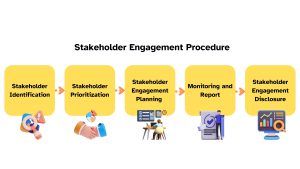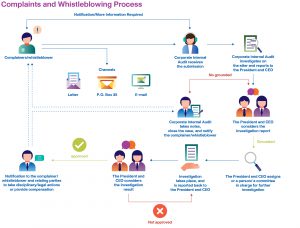Stakeholder Engagement
Management Approach
IRPC is committed to actively engaging with our stakeholders to foster a good and transparent relationship and build a foundation for success amid various business challenges, both current and future. IRPC’s sustainability strategy, emphasizing on “Climate Change, Circular Economy, Creating Social Value” aims to harmonize business objectives and stakeholder expectations. For this reason, IRPC defines stakeholder engagement beyond the conventional approaches to align with our commitments against external forces such as technological development, demographic shifts, climate change, and water stress. Our approach focuses on cultivating shared value between IRPC and our stakeholders, comprehensive engagement, and understanding the real issue. IRPC believe that this positive and sincere approach will create sustainability to our business as well as our stakeholders.
- Co-creation – IRPC focuses on collaboration and partnership of mutual interest between the company and our stakeholders, rather than solely focusing on potential risks that are relevant to IRPC’s business. The concept extends beyond traditional consulting and interviewing practices.
- Multi-level Engagement – IRPC aims to expand our engagement to include not only direct stakeholders, but also those who may be adversely affected by IRPC’s operations, regardless of their level of influence and authority.
- Deep Engagement – IRPC focuses on in-depth stakeholder on material issues that impact corporate strategy.

The company’s policy on stakeholder engagement is implemented through the Corporate Governance Handbook, which outlines code of conduct and practices towards identified stakeholder groups to maximize benefits and ensure fairness.
For more information, please refer to ‘Code of Conduct and Practices toward Stakeholders’ section of the Corporate Governance Handbook [link]
Implementation
IRPC has established a Stakeholder Engagement Procedure as a corporate guidance to understand stakeholders’ opinions, concerns, and comments. It delineates the purpose of stakeholder engagement, designates responsible functions, and outlines procedures to ensure that input from engagements is effectively utilized in crafting tailored engagement plans for each stakeholder.
For more information, please refer to IRPC Stakeholder Engagement Procedure [Link].
The purpose for stakeholder engagement is to appropriately manage stakeholder’s concerns and expectations, gain stakeholders’ trust and build good relationship with stakeholder. Moreover, stakeholders’ feedbacks will be considered in stakeholder engagement plan and acknowledged in the Corporate Sustainability Report. The procedure begins with stakeholder identification by relevant departments, considering factors such as responsibility, influence, relationship, dependence, and representation. Subsequently, stakeholders are prioritized based on their importance, determined by their influence for IRPC’s operations and impacts of IRPC’s operations to stakeholder. These findings inform tailored engagement strategies for stakeholders of differing importance as detailed in the Stakeholder Engagement Procedure. Relevant departments then monitor and report stakeholder engagement outcomes, encompassing stakeholders’ opinions, concerns, and comments, to the Sustainability Department. Critical issues are evaluated, and materiality issues are presented to the Corporate Governance and Sustainability Committee for approval.

Performance Summary
IRPC has assessed and identified stakeholders relevant to our business operations across the entire value chain, categorizing them into five key groups: 1) shareholders/investors, 2) employees, 3) customers/consumers,
4) suppliers, and 5) community, society, and environment. These stakeholder groups are prioritized based on their level of importance with engagement approach and frequency defined in response to their level of importance. As a result, three primary groups with a high level of significance to IRPC’s business have been delineated, including employees, customers, and communitiies. IRPC acknowledges the dynamic nature of business environments and commits to regularly reassessing stakeholder prioritization in response to changes in business context and strategies. This comprehensive approach allows us to continuously engage with stakeholders, understanding their issues of interest and concerns, which in turn enables effective responses to their expectations.
For more information, please refer to Outcome of Stakeholder Hearings Table in One Report, page 110-111 [link]
As part of our stakeholder engagement efforts, IRPC has implemented a complaint procedure to manage and track complaints, suggestions, and comments from our stakeholders. This procedure encompasses an assessment process and improvement management, including the identification of severity levels, response times, and the highest responsible function for each defined severity level. All complaints are handled through the Emergency Control Center, which operates 24 hours a day. They are then forwarded to the Operations and Environmental Quality Observatory, as well as the Production Departments, for investigation and subsequent reporting to the Board of Directors. Subsequently, IRPC commits to informing the complainant of any potential actions and remedies within 1 hour.
Furthermore, IRPC plans to develop Key Performance Indicators (KPIs) for Stakeholder Engagement and implement a lesson learned tracking system to enhance measurement effectiveness and maximize the adoption of lessons learned.




 Live Stream
Live Stream